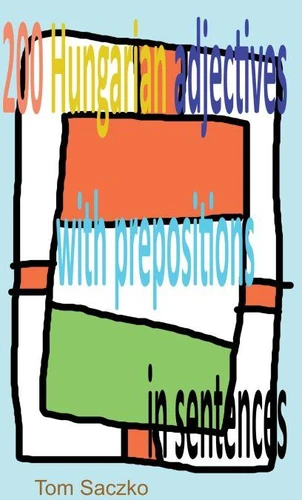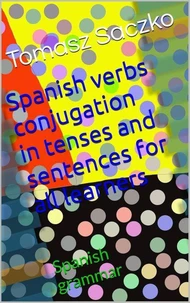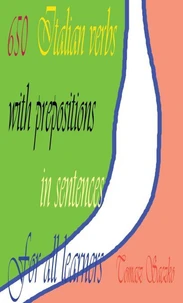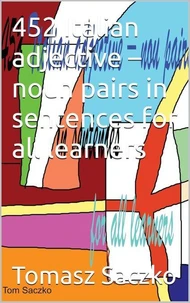200 Hungarian Adjectives With Prepositions In Sentences
Par :Formats :
Disponible dans votre compte client Decitre ou Furet du Nord dès validation de votre commande. Le format ePub est :
- Compatible avec une lecture sur My Vivlio (smartphone, tablette, ordinateur)
- Compatible avec une lecture sur liseuses Vivlio
- Pour les liseuses autres que Vivlio, vous devez utiliser le logiciel Adobe Digital Edition. Non compatible avec la lecture sur les liseuses Kindle, Remarkable et Sony
 , qui est-ce ?
, qui est-ce ?Notre partenaire de plateforme de lecture numérique où vous retrouverez l'ensemble de vos ebooks gratuitement
Pour en savoir plus sur nos ebooks, consultez notre aide en ligne ici
- FormatePub
- ISBN8231786183
- EAN9798231786183
- Date de parution08/07/2025
- Protection num.pas de protection
- Infos supplémentairesepub
- ÉditeurWalzone Press
Résumé
Hungarian is a richly expressive language with a unique grammatical structure that often combines adjectives with specific prepositions (or postpositions) to convey precise meanings and relationships. Unlike many Indo-European languages, Hungarian typically places these relational words after the noun or adjective they modify, following vowel harmony rules and case markings, which can make mastering adjective-preposition combinations challenging for learners.
This book, 200 Hungarian Adjectives with Prepositions in Sentences, is designed to provide a comprehensive and practical guide to these essential constructions. Each adjective-preposition pair is illustrated with carefully crafted example sentences that demonstrate natural usage in context. To support learners from diverse linguistic backgrounds, every sentence is accompanied by translations in English, German, Spanish, Italian, Ukrainian, and Polish.
Understanding how adjectives interact with prepositions in Hungarian is crucial because these combinations express a wide range of meanings-such as emotions, states, qualities, and spatial or abstract relations-that are fundamental to everyday communication. For example, adjectives like büszke vmire (proud of), elégedett vmivel (satisfied with), or függo vmitol (dependent on) are common and idiomatic expressions that require familiarity with both the adjective and its associated preposition.
Furthermore, Hungarian's use of postpositions and the attachment of prepositions to nouns following vowel harmony rules means that these adjective-preposition pairs are not only important for vocabulary building but also for mastering Hungarian sentence structure and fluency. This book aims to bridge the gap between theoretical grammar and practical usage by providing learners with a rich set of examples and translations that clarify meaning and usage.
Whether you are a beginner or an advanced student, this collection will enhance your understanding and confidence in using Hungarian adjectives with prepositions naturally and accurately.
This book, 200 Hungarian Adjectives with Prepositions in Sentences, is designed to provide a comprehensive and practical guide to these essential constructions. Each adjective-preposition pair is illustrated with carefully crafted example sentences that demonstrate natural usage in context. To support learners from diverse linguistic backgrounds, every sentence is accompanied by translations in English, German, Spanish, Italian, Ukrainian, and Polish.
Understanding how adjectives interact with prepositions in Hungarian is crucial because these combinations express a wide range of meanings-such as emotions, states, qualities, and spatial or abstract relations-that are fundamental to everyday communication. For example, adjectives like büszke vmire (proud of), elégedett vmivel (satisfied with), or függo vmitol (dependent on) are common and idiomatic expressions that require familiarity with both the adjective and its associated preposition.
Furthermore, Hungarian's use of postpositions and the attachment of prepositions to nouns following vowel harmony rules means that these adjective-preposition pairs are not only important for vocabulary building but also for mastering Hungarian sentence structure and fluency. This book aims to bridge the gap between theoretical grammar and practical usage by providing learners with a rich set of examples and translations that clarify meaning and usage.
Whether you are a beginner or an advanced student, this collection will enhance your understanding and confidence in using Hungarian adjectives with prepositions naturally and accurately.
Hungarian is a richly expressive language with a unique grammatical structure that often combines adjectives with specific prepositions (or postpositions) to convey precise meanings and relationships. Unlike many Indo-European languages, Hungarian typically places these relational words after the noun or adjective they modify, following vowel harmony rules and case markings, which can make mastering adjective-preposition combinations challenging for learners.
This book, 200 Hungarian Adjectives with Prepositions in Sentences, is designed to provide a comprehensive and practical guide to these essential constructions. Each adjective-preposition pair is illustrated with carefully crafted example sentences that demonstrate natural usage in context. To support learners from diverse linguistic backgrounds, every sentence is accompanied by translations in English, German, Spanish, Italian, Ukrainian, and Polish.
Understanding how adjectives interact with prepositions in Hungarian is crucial because these combinations express a wide range of meanings-such as emotions, states, qualities, and spatial or abstract relations-that are fundamental to everyday communication. For example, adjectives like büszke vmire (proud of), elégedett vmivel (satisfied with), or függo vmitol (dependent on) are common and idiomatic expressions that require familiarity with both the adjective and its associated preposition.
Furthermore, Hungarian's use of postpositions and the attachment of prepositions to nouns following vowel harmony rules means that these adjective-preposition pairs are not only important for vocabulary building but also for mastering Hungarian sentence structure and fluency. This book aims to bridge the gap between theoretical grammar and practical usage by providing learners with a rich set of examples and translations that clarify meaning and usage.
Whether you are a beginner or an advanced student, this collection will enhance your understanding and confidence in using Hungarian adjectives with prepositions naturally and accurately.
This book, 200 Hungarian Adjectives with Prepositions in Sentences, is designed to provide a comprehensive and practical guide to these essential constructions. Each adjective-preposition pair is illustrated with carefully crafted example sentences that demonstrate natural usage in context. To support learners from diverse linguistic backgrounds, every sentence is accompanied by translations in English, German, Spanish, Italian, Ukrainian, and Polish.
Understanding how adjectives interact with prepositions in Hungarian is crucial because these combinations express a wide range of meanings-such as emotions, states, qualities, and spatial or abstract relations-that are fundamental to everyday communication. For example, adjectives like büszke vmire (proud of), elégedett vmivel (satisfied with), or függo vmitol (dependent on) are common and idiomatic expressions that require familiarity with both the adjective and its associated preposition.
Furthermore, Hungarian's use of postpositions and the attachment of prepositions to nouns following vowel harmony rules means that these adjective-preposition pairs are not only important for vocabulary building but also for mastering Hungarian sentence structure and fluency. This book aims to bridge the gap between theoretical grammar and practical usage by providing learners with a rich set of examples and translations that clarify meaning and usage.
Whether you are a beginner or an advanced student, this collection will enhance your understanding and confidence in using Hungarian adjectives with prepositions naturally and accurately.






















